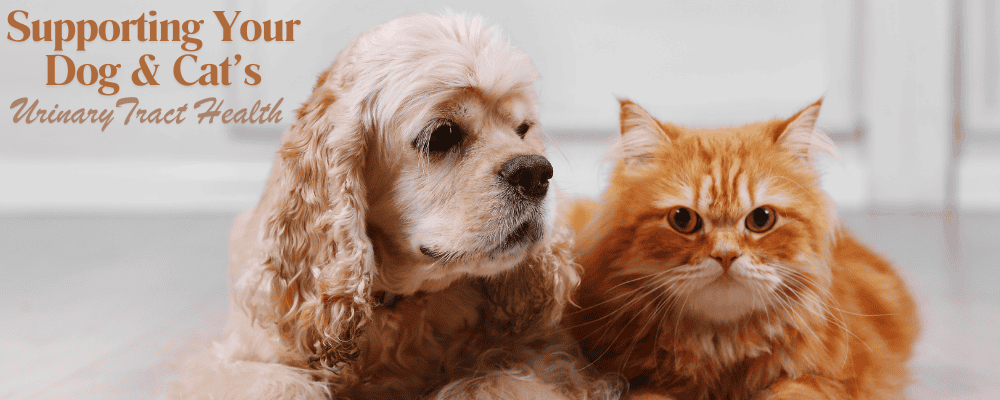Urinary health is an essential aspect of your pets’ overall well-being. Both dogs and cats can experience urinary tract problems, which can lead to serious health issues if left untreated. In this blog post, we’ll discuss some important tips for maintaining good urinary health for your furry friend.
Why is Urinary Health Important?
Maintaining good urinary health is crucial for both dogs and cats as it directly impacts their overall well-being. The urinary system plays a vital role in eliminating waste and toxins from their bodies, regulating fluid balance, and maintaining proper kidney function. Urinary tract problems, such as infections, bladder stones, or blockages, can cause discomfort, pain, and even life-threatening conditions if left untreated.
It’s important to know the signs of problems, such as a urinary tract infection in dogs and cats, so you can know how to help them. By prioritizing urinary health, pet owners can help prevent urinary issues and ensure their beloved dogs and cats lead happy, healthy lives.
Ensure Your Pets Stay Hydrated
Dehydration is one of the leading causes of urinary tract problems in pets. It’s important to ensure your pets have access to fresh water at all times, and that they’re drinking enough of it. It is recommended that dogs drink one ounce of water per pound of body weight daily. Cats, on the other hand, are recommended to drink 4 ounces of water per 5 pounds of body weight daily. You can encourage your pets to drink more water by providing them with a water fountain, adding a little bit of water to their food, or adding wet food to their diet.
If think your pet is producing too much urine, it is important that we work together to find out why, not just try to manage it by limiting their water intake.
Monitor Your Pets’ Urination
As a pet parent, you should be familiar with your pets’ normal urination habits. Detecting urinary tract problems in pets can be challenging, but there are several signs that may indicate an issue. One common symptom is frequent urination. If you notice your pet needing to urinate more often than usual, straining to urinate, or having accidents in the house despite being house-trained, it could be a sign of a urinary problem. Similarly, if your pet seems to be in pain while urinating, vocalizes during the process, or displays signs of discomfort like whimpering or whining, it’s crucial to pay attention and seek veterinary care. This could be a sign of a dog or cat urinary tract infection.
Changes in the appearance of urine can also be indicative of urinary tract problems. Keep an eye out for urine that appears cloudy, bloody, or has a strong, unpleasant odor. Cats, in particular, can suffer from Feline Urinary Tract Disease (FLUTD) – this can be caused by an accumulation of urinary stones or urinary crystals, or even stress.
It’s essential to note any of these symptoms and promptly consult with a veterinarian. They can conduct a thorough examination, perform diagnostic tests, and provide appropriate treatment to address your pet’s urinary health concerns.
Keep the Litter Box (and your pet) Clean
For cats, a dirty litter box can lead to urinary tract problems. It’s important to clean your cat’s litter box regularly to prevent the buildup of bacteria and other harmful substances. A good rule of thumb is to scoop the litter box at least once a day and completely replace the litter weekly.
Another important factor to consider is that cats are naturally good groomers – dogs, on the other hand, may not clean themselves as well. That’s why it’s important to keep them well-groomed, and bathe them regularly. This can help prevent buildup of bacteria that can cause UTIs and other urinary problems.
Consider Your Pets’ Diet
Your pets’ diet can have a big impact on their urinary health. Feeding your pets a high-quality, well-balanced diet can help prevent urinary tract problems. If your pet has a history of urinary tract disease, ask your vet if there is a pet food that’s specifically formulated for to prevent your pet’s problem.
One effective way to increase your pet’s hydration is by incorporating moisture-rich foods into their diet. For dogs, consider feeding them wet or canned food as a meal or a topper, as these options contain a higher water content compared to dry kibble. Kibble can often be dehydrating, due to the low moisture content. You can also mix a small amount of water into their meals to further enhance hydration. For cats, wet food is also an excellent choice
Visit the Vet Regularly
Regular veterinary checkups are important for maintaining your pets’ overall health, including their urinary health. We recommend regular lab work to pick up early changes in kidney function and to watch trends. Kidney problems are very common, especially in cats.
Your vet may also recommend a special prescription medication or diet to help treat any urinary problems your dog or cat is experiencing.
Maintaining good urinary health is important for your pets’ overall well-being. By following the tips outlined in this blog post, you can help keep your pets healthy and happy for years to come.
